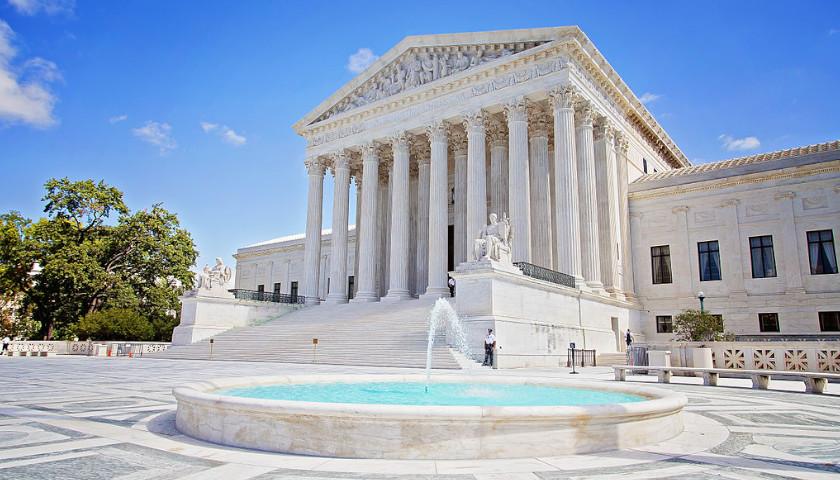by Kevin Daley
The Supreme Court ruled Monday that iPhone users can bring an antitrust lawsuit against Apple alleging the tech giant has monopolized the market for software applications.
Justice Brett Kavanaugh delivered the 5-4 decision, joined by the high court’s liberal bloc, which may have far-reaching consequences for Silicon Valley.
“The plaintiffs seek to hold retailers to account if the retailers engage in unlawful anticompetitive conduct that harms consumers who purchase from those retailers,” Kavanaugh wrote. “That is why we have antitrust law.”
The iPhone app market is a tightly-controlled system. iPhones are programmed so they cannot download apps outside the Apple-administered App Store, and users who modify their devices to download apps from other sources — called jailbreaking — risk adverse consequences like voiding their warranty. What’s more, Apple has broad discretion over products in its store, and may remove apps for any reason whatever.
 Other requirements include a mandate to price all apps on a .99 scale, like $1.99 and $2.99.
Other requirements include a mandate to price all apps on a .99 scale, like $1.99 and $2.99.
When an application is purchased, Apple collects a 30 percent commission and gives the other 70 percent to the developer. For subscriptions, Apple collects a 15 percent share after the first year.
Taken together, the plaintiffs say this constitutes an unlawful monopoly: consumers are forced to purchase apps in a digital storefront Apple controls, and end up paying higher prices because developers price in the 30 percent commission Apple collects, effectively passing the burden on to consumers.
Apple countered that only “direct purchasers” can bring overpricing claims. Here, Apple said, the company merely curates a digital space for users to browse products and connect with developers, while the developers set retail prices. Critically, any allegedly anticompetitive behavior arises in the relationship between Apple and the developers, not Apple and smartphone users.
What’s more, Apple said the injury the plaintiffs are alleging — that developers price in the company’s commission — is exactly the sort of pass-on damages claim the direct purchaser rule means to avoid.
The Court said Apple’s arguments were unpersuasive. Since there is no middle man between Apple and iPhone owners, Kavanaugh explained, the users may sue.
“There is no intermediary in the distribution chain between Apple and the consumer,” Kavanaugh wrote. “The iPhone owners purchase apps directly from the retailer Apple, who is the alleged antitrust violator. The iPhone owners pay the alleged overcharge directly to Apple. The absence of an intermediary is dispositive.”
Elsewhere in the opinion, the Court said it was not relevant that developers set prices instead of Apple, saying the arrangement between a supplier and a retailer should not determine whether the plaintiffs can sue.
“Apple’s line-drawing does not make a lot of sense, other than as a way to gerrymander Apple out of this and similar lawsuits,” Kavanaugh wrote.
The justices cautioned that their ruling was narrow. The sole question before the Supreme Court was whether the users can move forward with their lawsuit, not whether Apple has broken the antitrust laws.
“At this early pleadings stage of the litigation, we do not assess the merits of the plaintiffs’ antitrust claims against Apple, nor do we consider any other defenses Apple might have,” the decision reads. “We merely hold that the direct purchaser rule does not bar these plaintiffs from suing Apple under the antitrust laws.”
Justice Neil Gorsuch led the conservatives in dissent. Gorsuch accused the majority of ignoring economic reality and replacing the direct purchaser rule with a senseless alternative that will make transactions less efficient.
“No antitrust reason exists to treat these contractual arrangements differently, and doing so will only induce firms to abandon their preferred — and presumably more efficient — distribution arrangements in favor of less efficient ones, all so they might avoid an arbitrary legal rule,” Gorsuch wrote.
App Store sales represent about one third of Apple’s growing Services division, which includes other tools like Apple Pay. The Services division is positioned to play a significant role in the company’s future.
Industry groups predicted that Monday’s ruling would attract a wave of litigation against other tech companies who run similar services, like online gaming platforms.
“Ten years ago getting software was quite a different and onerous process — our members count on platforms that enable customers to purchase software safely, easily and with confidence,” said Morgan Reed of ACT | The App Association. “Under this decision, only trial lawyers will benefit from the simplification of platforms as a retailer and vendor model.”
Apple shares tumbled following the decision. At the close of market trading, stocks settled at $185.72, down 5.81 percent from Monday’s opening.
– – –
Kevin Daley is a reporter at Daily Caller News Foundation. Follow Kevin on Twitter.
Image “App Store” by Apple.




